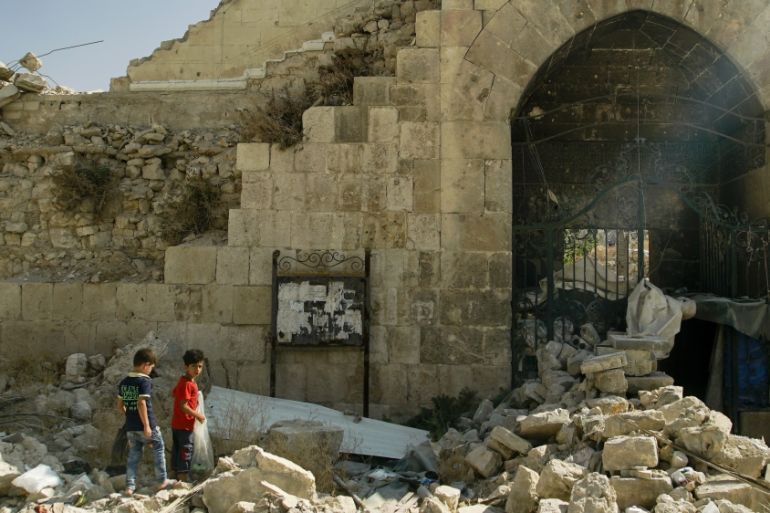‘Totally destroyed’: East Aleppo a year after battle
Many are living without clean water and power nearly a year after government forces retook the Syrian city.

A year after a deadly battle ravaged the Syrian city, residents of East Aleppo are still struggling to recover.
The northwestern city bears scars of the government-led offensive last year, and those living in east Aleppo need assistance to regain a sense of normalcy, aid workers told Al Jazeera.
Keep reading
list of 4 itemsIs the ICC going to issue arrest warrants for Israel and Hamas leaders?
Russian playwright and director go on trial over ‘justifying terrorism’
UK court to rule on Julian Assange extradition appeal: What could happen?
Around 300,000 displaced Aleppans have returned to the east of the city since the start of 2017, according to the United Nations refugee agency, UNHCR.
“The humanitarian situation is slightly getting better, but there is a lot of destruction still in the city, be it in terms of infrastructure or the houses of the families,” Ingy Sedky, a spokesperson for the International Committee of the Red Cross (ICRC) in Syria, told Al Jazeera in a telephone interview from Damascus.
With some neighbourhoods “still totally destroyed”, there are also growing concerns over shortages of electricity and clean water. Many residents are relying on generators, which cost around $3 per ampere a week.
Aid organisations are helping to meet the water needs by providing tanks, but more must be done to fully restore the supply.
Daily meals, winter supplies, medical assistance and post-traumatic rehabilitation are also being provided to try to get the city back to the “pre-crisis level”.
“The availability of services is very limited,” said Massimo Diana, the Syria representative for the United Nations Population Fund.
![Military checkpoints are spread throughout the eastern neighbourhoods [Max Black/AP]](/wp-content/uploads/2017/11/074838a386eb4b40bd6730cb0edb608d_18.jpeg)
Security concerns
Syrian government forces, backed by allied groups and Russia, launched a major offensive to retake rebel-held districts of eastern Aleppo one year ago, in September 2016.
As the fighting intensified in November, bloody images of trapped civilians, bombed hospitals and distraught children flooded the news.
At least 463 civilians died, including 62 children, according to the UK-based Syrian Observatory for Human Rights. After a month-long army onslaught, Syrian government forces “fully recaptured” eastern Aleppo from the rebels on December 22, 2016.
A year since the deadly battle, Aleppo has again come under heavy bombardment by government warplanes targeting rebel fighters in recent weeks.
More than 60 people were killed and dozens more wounded in three air raids on a busy market in Atareb, a town in the Aleppo countryside, earlier this week.
|
|
“We believe that the biggest challenge for the residents currently is the military checkpoints spread in the eastern neighbourhoods, due to fear of arrest and forced disappearance,” said Fadel Abdul Ghany, the founder of the Syrian Network for Human Rights.
Ayman Al-Sheikh, who worked as a surgeon for the Syrian American Medical Society in Aleppo for four years before it was evacuated, said people just want an end to all the “killing, the bombing and air strikes”.
“They [civilians] want their rights, equality and freedom,” said Sheikh, who now works in Idlib.
Restoring hope
The Aleppo Project, an open collaboration among Syrian refugees, students, academics and policy experts, is looking to help the rebuilding process.
|
|
The four-member team based in Budapest has interviewed more than 1,000 Aleppans – both at home and in exile – about their relationship with the city, experiences with war and displacement, and vision for the future.
AlHakam Shaar, a research fellow with the Aleppo Project, said that despite corruption and a lack of security and services, progress has been made – but the biggest challenge is the return of displaced residents.
“With a semi-functional system, the fear of persecution and the extortion at security checkpoints, the displaced cannot return, much of the city will not be rebuilt, and cosmopolitan Aleppo will be reduced to a shadow of its past self,” Shaar told Al Jazeera in an email interview.
Still, Diana said, it remains important to restore hope among civilians and to give them a sense that the “worst is over”.
Damascus resident Iad Tawil, who studied law at the University of Aleppo, spent his recent Eid-al-Fitr holidays with friends and family in Aleppo. The celebrations were “not about the pleasure; it was more about the relief”, he said.
“People of Aleppo actually like to live, they love to live.”
Follow Saba Aziz on Twitter: @saba_aziz